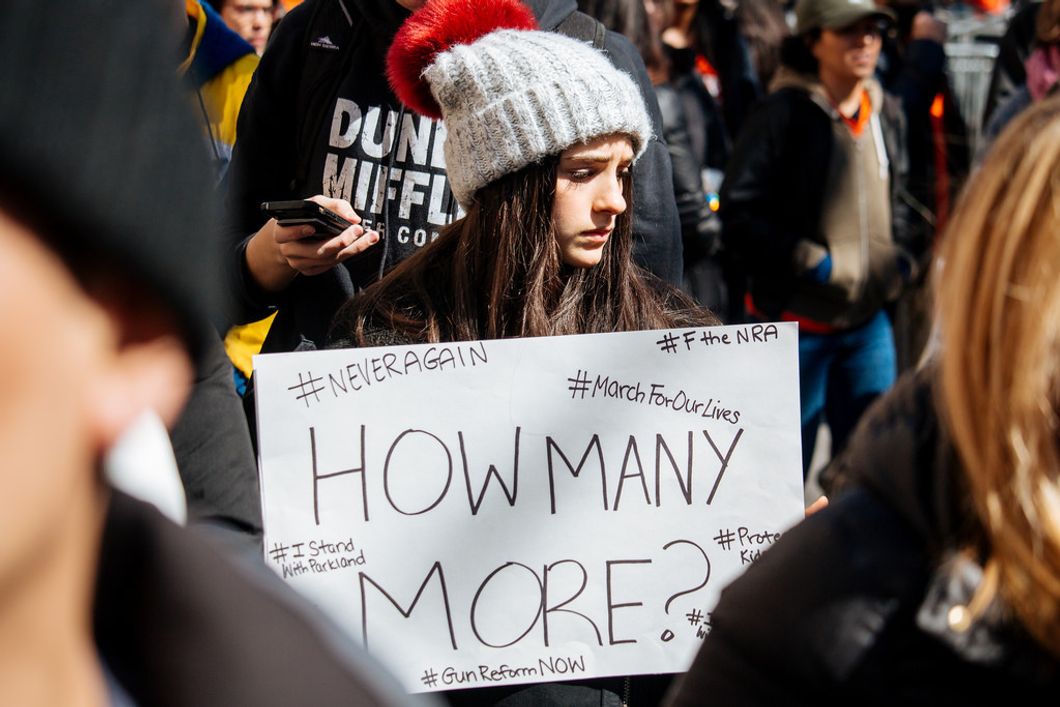Last Valentine's day, 17 people were murdered in a mass shooting at Marjory Stoneman Douglas High School in Parkland, Florida. Following this horrific tragedy student survivors did their best to make their voices heard. They campaigned for safer gun laws in the Florida states capital and in Washington D.C., crying out to their political leaders "Never Again." They pleaded with President Trump to enact change, and their perseverance sparked youth activism across the country. Despite their efforts, a year later it seems that not much has changed, as tragedy after tragedy followed Parkland due to unchecked gun violence. Those in support of stricter gun laws still call for change, and pro-gun individuals still push back. The NRA remains extremely powerful while senseless acts of gun violence continue to take place across the country.
Those who strongly oppose stricter gun laws often bring up that the Second Amendment gives Americans the right to bear arms and to restrict that freedom would be unconstitutional. Many also fear an all-powerful government ruling unarmed citizens. However, the Second Amendment was written into the Constitution in 1791. Those creating this amendment did not and could not have known about the technological advances in future weaponry. Guns used in 1791 could only fire about three effective rounds per minutes, and this was only when used by a skilled gunman. Guns like AR-15-style rifles — like the one used in the Parkland shooting — are semi-automatic weapons with high-capacity magazines and high lethality. Although many Americans feel as though stricter gun laws would infringe on their basic rights, it seems criminally careless to ignore the way times have changed since the drafting of the Constitution.
It may be impossible to completely ban guns in the United States due to the immense amount of guns in circulation across the country. However, all countries with more restrictive gun laws than the United States subsequently have less gun homicide and suicide rates. A study conducted in 2016 showed that the United States had gun homicide rates 25.3 times higher than any other heavily populated, high-income country. Rates for mass shootings in countries with strict gun laws pale in comparison to the United State's climbing numbers.
Semi-automatic, high-capacity weapons may be fun for avid hunters, but if stricter rules regarding them saved lives it seems morally wrong to oppose restrictions. Hunting can still be enjoyed with the use of less dangerous weapons or after obtaining a gun through a more intense process. Another argument against stricter gun laws in the idea that "a good guy with a gun can stop a bad guy with a gun." People have gone as far as to suggest that teachers should be armed in case of attack. An armed security guard at Parkland was ineffective at stopping the attack and many of the other mass attacks have been unavoidable, even in the presence of an armed "good guy." It is extremely difficult to take down an active shooter, even for those trained in law enforcement. Our philosophy when dealing with mass shooters should be prevention, not defense. The only completely effective way to avoid this kind of senseless tragedy is to attempt to ensure a potential shooter never has the chance to own or borrow a gun like the AR-15.
Although there are many responsible gun owners across the country, when weighing their right to easily accessible semi-automatic weapons against the lives of children and other innocent individuals, it seems that stricter gun laws are the only answer. The government has failed to respond to the calls of the traumatized Parkland survivors. Gun violence occurs every day, and the mass shootings, planned homicides, and accidental deaths won't decrease until our whole country says, "Never Again."

















